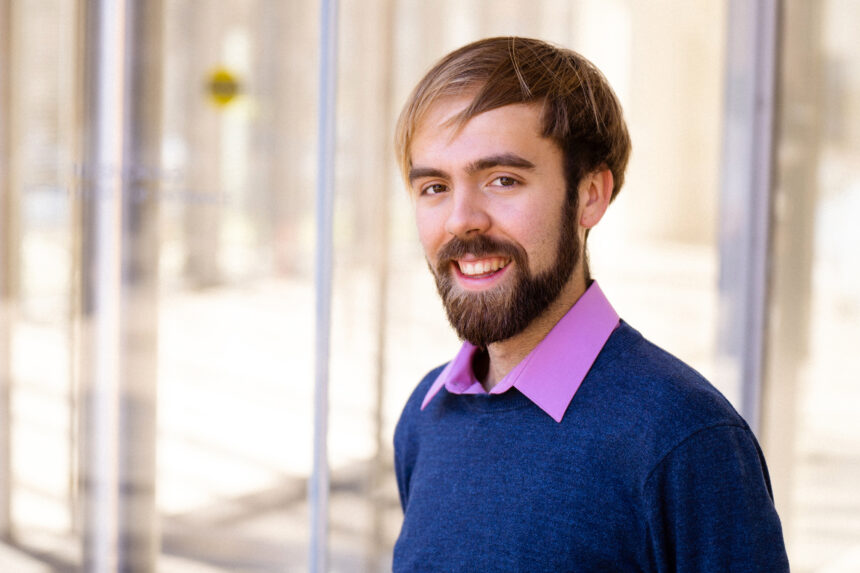Matthew Kearney was drawn to MIT by the culture of its cross-country team. Growing up in Austin, Texas, he loved spending time outdoors and playing soccer, but by high school running had become his primary sport. While looking at colleges, he wanted to find a place with both strong academics and a strong team community. After an official visit with the cross-country team, he knew MIT was the place for him.
“It’s been truly a defining part of my MIT experience,” says Kearney. “I love how quirky and fun and weird in the best way everyone is, and that atmosphere of doing things a little bit differently. That’s what sold me beyond the obvious academic and research reasons.”
Now a senior, and a team captain, Kearney has made the most of his athletic and academic experiences. He arrived at MIT expecting to major in electrical engineering and computer science but fell in love with philosophy after taking 24.02 (Moral Problems and the Good Life). He’s majoring in both while also completing a master’s degree in computer science and engineering.
“The part of philosophy that interests me is thinking about how we want to live our lives as people, what matters to us, what’s valuable to us, and how can we do it in a way that respects the values that matter to other people,” says Kearney. “I’ve really enjoyed more abstract but purposeful thinking to complement the technical rigor that’s gone on with my computer science major.”
Kearney’s interests intersect in the field of artificial intelligence ethics, where he hopes to leverage his interdisciplinary education to thoughtfully examine and design artificial intelligence systems. Following graduation, he will pursue a DPhil in computer science at Oxford University as a Rhodes Scholar.
“There’s not a lot of dialogue that goes from the abstract tenets of moral philosophy all the way to the practical building of an AI tool to solve a problem,” says Kearney. “In my DPhil, I want to ask how we can start off with the goal of building certain ethical principles into AI, and how can we bring that down layers of abstraction until we understand what technical tools we can build to help realize those goals.”
Outside of the classroom, Kearney has been excelling as well. The cross-country team captured a national title in the fall — not only the first in program history but also the first NCAA team championship by an MIT athletic team — with Kearney also picking up individual All-American honors.
Human-centered AI design
Kearney is currently working on two research efforts. The first is a project with the Human Systems Lab, where he is designing downscaling methods to apply to climate data. Most models are on a global scale, but being able to predict how local regions will be affected could help guide effective policy and provide insight to people living in the region.
For his master’s thesis, Kearney is helping to develop a deeper understanding of large language models, which are used to build tools such as ChatGPT. Beyond gaining the technical knowledge, Kearney is also always thinking about the ethical ramifications of these tools.
“Under the hood, people aren’t entirely sure why these models make certain decisions,” says Kearney. “They understand mathematically how it works, but they don’t know why models make individual decisions. The focus of my research has been trying to understand where concepts are located in the networks, and how are they recognized and transformed throughout the network. Then we can start to understand both the fairness and ethical questions about the model.”
At a high level, Kearney is interested in picking apart these models to understand them from all angles. He recognizes the immense potential artificial intelligence has to impact many different fields, but he also recognizes the need to wield technology thoughtfully. This insight was sparked by the class 6.882 (Ethical Machine Learning in Human Deployments), a special subject offered by Assistant Professor Marzyeh Ghassemi in spring 2022.
“My technical education taught me that any problem can be solved if we throw enough engineering and technology at it,” says Kearney, adding that he believes he and many others have blind spots in their technical research. “This class really helped me exit that headspace to see that these problems can only be solved through social-centered, or economic, or political approaches. We need to think about how we can use tools from other disciplines to be thoughtful about how we’re using those technologies.”
Kearney sees an opportunity for his work to make an impact in a range of areas, from health care to bank loans.
“In application areas where we know there is already bias built into the models systemically, they’re at risk of it carrying over into model decisions that are made,” says Kearney. “Nevertheless, these models are going to continue to be used and made, and it’s important that they’re made in the way that one, we can understand how they’re actually working, and two, we can guarantee fairer outcomes.”
Kearney finds computer science and philosophy to be in constant dialogue with each other, and is inspired by the pioneers in the field of AI ethics to continue building deliberate systems that make a positive impact on the world.
As he wraps up his time at MIT, Kearney is also looking forward to closing out his final track seasons strong, following the success of the cross-country team.
“This fall was the closest and most tight-knit the team’s ever been,” says Kearney. “We have such incredible talent in coaching this year, and already so many more national qualifiers than we’ve ever had. I’m excited to see what happens with it and to go out with a bang.”
Read the full article here












